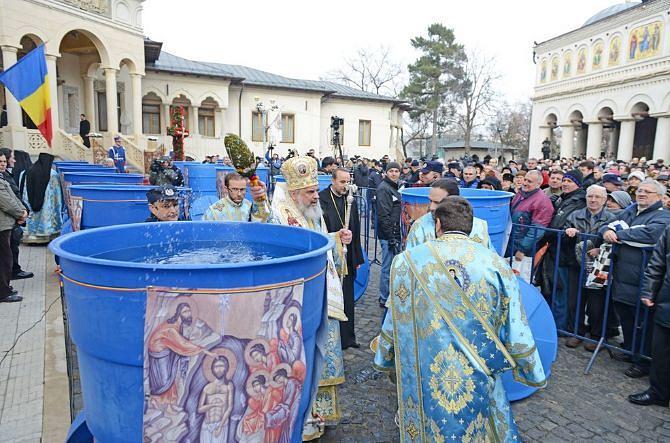Winter celebrations end in Romania with the Epiphany and St. John’s Day

The winter holidays end in Romania this week with two of the most important religious celebrations in the country, the Epiphany (Boboteaza in Romanian), and St. John’s Day.
The Epiphany Day, which the Christians in Romania celebrate today, January 6, marks the day when Jesus was baptized in the Jordan River by John the Baptist (the Saint celebrated on January 7).
Like most religious holidays in Romania, the Epiphany also comes with traditions and superstitions. For example, it is said that single young girls who put a twig of basil under their pillow the night before Boboteaza will dream their future husband. Moreover, the young girls who fall on the ice on the Epiphany day will for sure get married that year.
On the eve and the day of Epiphany, priests across all Orthodox churches in Romania bless the waters. Then, they use the holy water (aghiasma in Romanian) to bless people’s houses. The believers also drink the water every morning, usually before breakfast, between January 6 and January 14, to purify themselves.
On the day of the Epiphany, people go to the church to attend the religious mass and fill their bottles with the holy water. Some of the religious ceremonies organised on this day take place near large bodies of water, such as rivers or the sea, which the priests also bless. In the cities located near rivers or the sea, it is customary for the priest to throw a wooden cross into the cold water and for young men to go to search for the cross. The one who finds the cross and brings it back is said to get purified of all sins.
However, the Archdiocese of Tomis announced that the religious ceremony and the blessing of the Black Sea waters would no longer take place this year due to the extremely bad weather, according to media reports. Moreover, the religious ceremonies that were usually organised near the Danube and the tradition of throwing the cross into the river’s waters were also cancelled.
The cold weather is not something Romanians wouldn’t expect, as it usually gets extremely cold in Romania during this period. This is why the Romanians use the expression the Epiphany’s Frost for this time of year. The blizzard that hit Romania on Friday can also be a good thing according to Epiphany Day superstitions, which say that, if the fruit trees are covered in frost on the morning of the Epiphany, they will make a lot of fruits.
Saturday, January 7, is also an important day for the Christians in Romania, as they celebrate St. John’s Day. On this day, they attend the religious mass and try not to do any laundry or other work around the house. Nearly 2 million Romanians bear the name of John (Ioan, Ion, Ioana, Ionela, and so on), so don’t forget to wish them a happy name day!
Irina Popescu, irina.popescu@romania-insider.com












